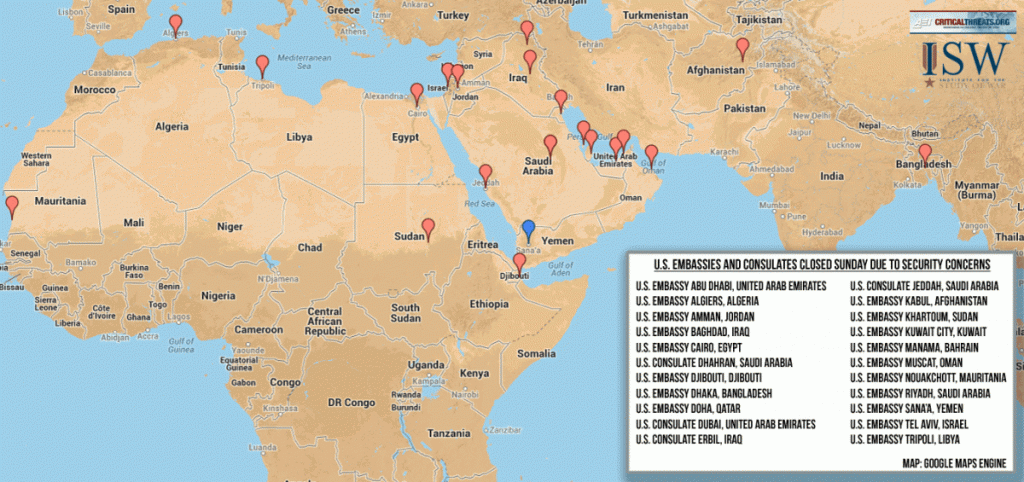{{currentView.title}}
August 05, 2013
Al Qaeda Threat to American Interests
Al Qaeda in the Arabian Peninsula (AQAP) may be in the final stages of preparing an attack on American interests in the Middle East and North Africa (MENA) region on August 7, 2013. A number of factors suggest that the attack widely expected for Sunday, August 4, may, in fact, be planned for Wednesday, August 7.
Discussion
The U.S. Department of State issued a Worldwide Travel Alert on August 2, 2013 warning of an increased threat of terrorist attacks in the Middle East and North Africa (MENA) region until August 31. The Department of State then announced the closure of over 20 U.S. embassies and consulates Sunday, August 4, following credible intelligence that the attack would occur on that day. An update announced that most of the posts will remain closed through August 10 as a security precaution.
It is possible that AQAP intentionally tipped-off the American intelligence community (IC) to test America’s security posture abroad. If this is the case, it is unlikely that AQAP planned to conduct the attack on August 4.
A senior U.S. official noted that the group broke “operational security,” which is how the communications were intercepted.
- It is not known whether this breach was intentional or not, but the Associated Press reported that AQAP was among the first terrorist groups to alter its communications protocols following the Edward Snowden leak, indicating a high level of security awareness and the ability to react quickly. The intercepted message may have resulted from a failure of al Qaeda members to observe the new protocols, but it may also have been misdirection.
If AQAP intends to conduct a spectacular attack, a number of factors suggest that it could occur on August 7.
The last day of the Islamic holy month of Ramadan, a period that has historically seen an increase in terrorist attacks, is expected to be August 7.
- August 7 marks the 15-year anniversary of the East Africa embassy bombings in Nairobi, Kenya, and Dar es Salaam, Tanzania. The simultaneous attacks raised al Qaeda’s profile to the international level.
- It also marks the 23-year anniversary of the launch of Operation Desert Shield. Osama bin Laden, who had returned to Saudi Arabia, repeatedly and publicly denounced Saudi Arabia’s dependence on the United States military for protection, which led to his exile in 1992. Bin Laden would issue a fatwa in 1996 calling for American troops to leave Saudi Arabia.
The target of AQAP’s putative attack is not clear, however. The American diplomatic posts that are to remain closed all fall within range of AQAP’s external operations.
The timing and scale of the attack may also reflect broader shifts in the al Qaeda network. Seth Jones, a senior analyst at RAND Corporation, has noted that Nasser al Wahayshi, the emir of AQAP, was recently appointed al Qaeda’s second-in-command. Wahayshi served as bin Laden’s personal secretary and helped lead the revival of al Qaeda in Yemen. AQAP now poses the most direct threat to the United States homeland of all the affiliates. Wahayshi may have updated al Qaeda emir Ayman al Zawahiri of his plans to conduct this attack, which may have led Zawahiri to focus his message last week to attack American targets in the Middle East and beyond.
There has been an uptick in reported airstrikes in Yemen in the past week, which may be related to the intercepted communications about this attack. Strikes were reported in Hadramawt on August 1, Shabwah on July 30, and Abyan on July 27—all in traditional AQAP strongholds. It remains to be seen whether these strikes, the closure of diplomatic posts, and other steps the U.S. and its allies may be taking have disrupted the plot.

